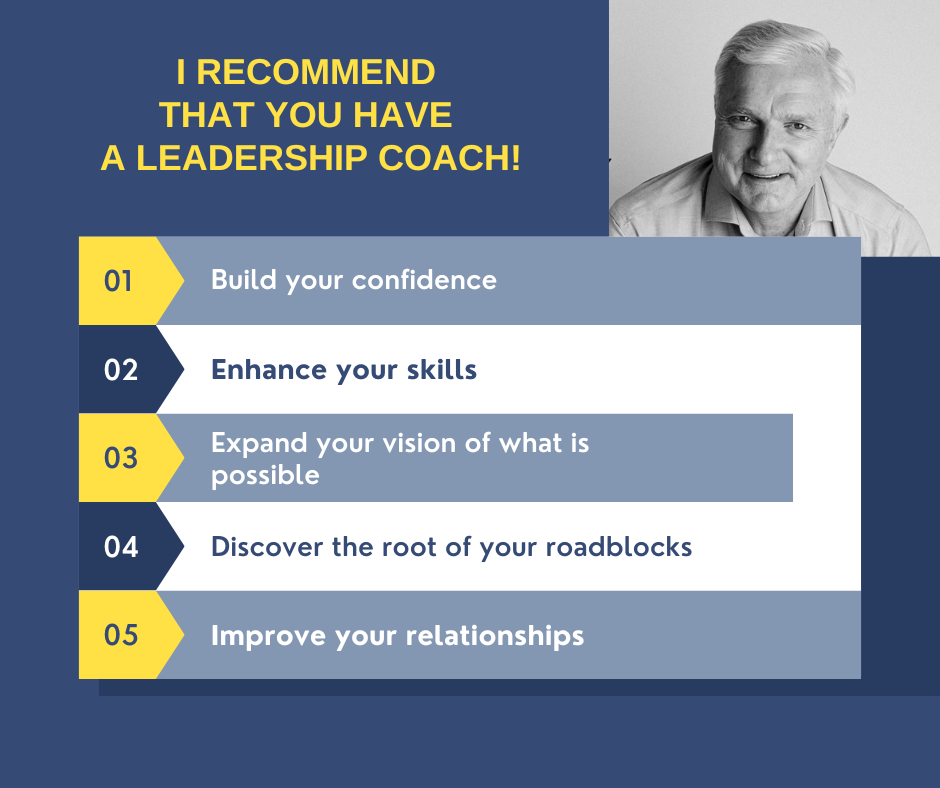I Recommend You Engage a Leadership Coach
A leadership coach is like a rocket for those looking to elevate their careers and prepare for the future. Nowadays, career advancement is about more than just skills or experience. It’s about how you navigate your journey.
A large body of research categorically states that coaching is truly transformative for individuals looking to grow in their careers.
Organizations have developed to ask more questions about their Human Resource development decisions, such as:
- What are the benefits of providing leadership coaching?
- What is the return on investment?
- Does it actually work?
How Coaching Contributes to Your Success
Coaching can and does contribute in three critical ways to an individual’s leadership development.
Coaching helps leaders, managers, and supervisors transfer learning from the classroom to the workplace, personalizing the material and making relevant links from theory to practice.
Leadership coaching helps enhance skills. Through the coaching relationship, you experience the development of new skills. You work together to develop a personal implementation plan based on your unique circumstances.
In that process, you will consider the barriers and assess who can support your new behavioral change. Habit formation is complex, and having support from your more comprehensive network is critical to successfully breaking or forming new habits.
A Coach offers insights toward greater self-awareness.
Coaches will often use Socratic questions to help in this area.
Examples of Socratic questions include (but are certainly not limited to) these:
- Why do you say that?
- What do you mean by?
- How does this relate to our discussion?
- What do you think is the main issue?
- Could you expand upon that point further?
Is a Leadership Coach Right For You?
Let’s examine a top ten list of things to consider when partnering with a leadership coach.
1. Personalized Guidance
Have you ever felt lost in a sea of advice? Individual coaching cuts through the noise. It offers tailored guidance that aligns with your unique goals and aspirations—no generic solutions here—just strategies that work for YOU.
2. Clearer Career Path
Navigating your career can feel like steering through the fog. A coach helps clear the path. Together, you’ll map your career trajectory, identify your strengths, and set achievable milestones. The result is a focused, actionable plan that drives you forward.
3. Enhanced Self-Awareness
Success begins with self-awareness. Individual coaching encourages deep reflection, helping you understand your strengths, weaknesses, and potential blind spots. This self-awareness is crucial for making informed decisions and seizing the right opportunities.
4. Overcoming Challenges
Every career has its hurdles. Individual coaching equips you with strategies to overcome these challenges, whether a lack of confidence or a complex work environment. It’s about transforming obstacles into opportunities for growth.
5. Skill Development
Think of coaching as a personal development toolkit. You’ll sharpen your skills—communication, leadership, problem-solving—and acquire new ones tailored to your career goals. These enhanced skills make you more competitive and prepared for future roles.
6. Accountability and Motivation
We all need a push sometimes. A coach holds you accountable, ensuring you stay on track with your goals. This external motivation can be the difference between stagnation and progress. With a coach, your aspirations turn into actionable steps.
7. Better Decision-Making
With a coach, you gain a sounding board for critical decisions. They offer an objective perspective, helping you weigh options and choose the best path forward. This informed decision-making can significantly impact your career trajectory.
8. Future-Readiness
The job market is evolving rapidly. Individual coaching prepares you for these changes, equipping you with the skills and mindset needed for future opportunities. Stay ahead of trends and position yourself as a leader in your field.
9. Building Confidence
Confidence isn’t just a trait; it’s a skill. Coaching helps build and reinforce your confidence, enabling you to positively tackle new challenges and seize opportunities. This confidence is often the key to unlocking new career heights.
10. Long-Term Success
Coaching isn’t a quick fix; it’s a long-term investment. The skills, insights, and strategies you gain benefit you throughout your career. It’s about creating a solid foundation for sustained success and fulfillment.
Olympic Gold, Silver, and Bronze
Did you watch the Olympics in Paris this year? It has been a feast for the senses, for sure. I was particularly taken with the scene as my favorite movie of all time, Chariots of Fire, was about the buildup to the last time the Olympics took place in the “City of Love.”
Every athlete had a coach alongside them, no matter their discipline or sport. That is why they could get to the Games and represent their country at the peak of their careers.
If you want to be the best version of yourself, consider a coach.
Resistance is Not The Guide
Not everyone feels comfortable with the idea of coaching at first. It’s not unusual to feel a bit of resistance, especially if you have been “forced” to do so by an employer.
Let me encourage you to try it out. Mediocrity will promote the status quo, to do what we have always done, to resist change.
My readers are always looking to be the best they can be, and I urge you to consider the benefits of a coaching experience.
Would you like to explore the opportunity of a leadership coach and make an investment in your future? Contact us – we would be happy to help! Reach out to info@fioregroup.org.
What to Read
- Co-Active Coaching: The proven framework for transformative conversations in work and in life. By Henry Kimsey-House, Karen Kimsey-House, Phillip Sandahl and Laura Whitworth.
- Coaching for Performance: The principles and practice of coaching and leadership. John Whitmore
- Coaching Questions: A coach’s guide to powerful asking skills. Tony Stoltzfus






